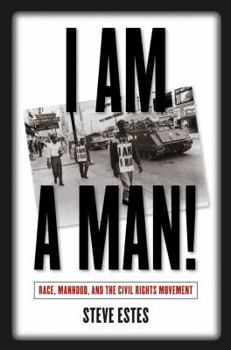I Am a Man!: Race, Manhood, and the Civil Rights Movement
Select Format
Select Condition 
Book Overview
The civil rights movement was first and foremost a struggle for racial equality, but questions of gender lay deeply embedded within this struggle. Steve Estes explores key groups, leaders, and events... This description may be from another edition of this product.
Format:Paperback
Language:English
ISBN:0807855936
ISBN13:9780807855935
Release Date:March 2005
Publisher:University of North Carolina Press
Length:252 Pages
Weight:0.85 lbs.
Dimensions:0.6" x 6.3" x 9.4"
Customer Reviews
1 rating
Black masculinity is a political force
Published by Thriftbooks.com User , 18 years ago
Borrowing from a research model pioneered by feminist scholars, Steve Estes examines the history of African American men in a racialized-gendered context to argue that black men's masculinity was at stake throughout these struggles. The assistant professor of history at Sonoma State College produces an interesting and readable account of state politics. Examining the politics of representing black men's bodies, he argues that appearance can and does effectively influence civil rights. From the days of slavery to the civil rights movement, black men being too assertive in the public sphere was a breach of the 'social order' established by racist white society. Even people who were allegedly on their side (white abolitionists) depicted black men as 'begging' for their freedom, inferring dependence and weakness--decidedly 'unmasculine' traits. Alternately, black men's sexuality was portrayed as a threat to the established order. A black man who had any degree of contact with a white woman in any context risked being perceived as the 'rapist' an ultra-masculine stereotype. Ironically, the white individuals and their organized hate groups claimed to only be protecting white women with the subsequent lynching being through `white masculinity's' obligation to `protect' the women of `our community'. Because it was safer for black men during those times, they consequently adopted a position of subservience to the 'larger world'. Black women took an active lead in the earliest civil rights movements out of practicality. Whether they had all of the theories our society now has access to, the Black Panthers also articulated a critique of black masculinity and political legitimacy. Sharply contrasting against the buffoonish 'Jim Crow' their ideal black man was an articulate, proactive, solider fighting on behalf of himself, his community, and his people. Estes is passionate about his work and makes a generally convincing case for his thesis. I am curious that his manuscript did not include a more extensive examination of the Black Pather's articulated desire to build (then-unprecedented) alliances with homosexuals and women. There's some information about each group in this book, but nothing about this earliest coalition building attempt and nothing how that action had challenged heterosexism within the Black Panthers, or the after effects for black masculinity as a political force.





